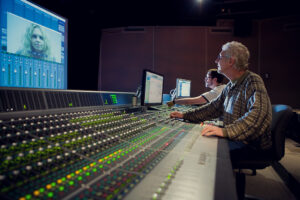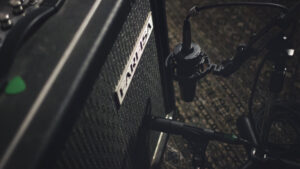Are you an independent artist/musician that makes music for the sync licensing industry?
Great! This is an article I wish I’d read when I was beginning to license my music for TV, Film and New Media. The truth is that music copyright law is quite complicated…
I’m also not qualified to give you legal advice, so I thought I’d provide some simple guidelines instead.
You’ll learn about the copyrights you’ll create each time you press record and/or put a pen to paper. You’ll also learn how to grant access to 3rd parties to use your music commercially and how each type of music licensing agreement affects your rights.
Lastly, I’ll be suggesting a few things to properly protect your intellectual property.
- The Difference Between Music Copyright and Music Licensing
- 2 Types of Music Copyright
- 6 Exclusive Rights of Music Copyright Owners
- 3 Types of Music Licensing Agreements
- 4 Tips To Protect Your Music Copyrights
- Summary: Copyright Guidelines for Music Licensing
The Difference Between Music Copyright and Licensing Agreements
Okay, so the first concept we need to understand is the difference between music copyright and licensing agreements.
Basically, copyright is what you create when you record/compose music.
Licensing agreements GRANT ACCESS to use your master recording and/or musical work in a commercial context (i.e. advertisement, trailer, etc…).
To elaborate on that, there are actually 2 types of music copyright…
- Master Recording
- Musical Work (composition)
We’ll be talking more about these in the next section.
However, the most important thing to keep in mind for the purposes of sync licensing is that you (as the songwriter) may own one or BOTH of these copyrights.
It’s important to know because music supervisors and music libraries want to know WHO owns the copyrighted material.
You’ll have an easier time if you own 100% of your music copyrights, BUT…
If you don’t, just make sure you know who does (and have that information on-hand).
Once that’s done, you’ll most likely be ready to start understanding the 6 exclusive rights of music copyright owners (which we’ll elaborate on later).
Just keep in mind that these rights might be distributed amongst the different copyright owners (if there are many).
That’s when we’ll get into music licensing agreements and find out if you’re eligible to issue them…
2 Types of Music Copyright
The Master Recording
Nowadays, music is usually recorded BEFORE it’s written.
It’s not always the case, but let’s just say that the music industry is much more product-oriented in today’s climate.
That being said, most songwriters are also music producers.
For the first time in history, the songwriter can own both the master recording AND the musical work. That’s VERY relevant in the sync licensing industry.
Why’s that? It’s because you don’t need a record label anymore!
The composer can sign-off his/her own music without asking ANYBODY for permission.
So, the master recording copyright is created the moment you’ve stopped recording.
The Musical Work (Composition)
Back in the day, the only type of music copyright was the musical work.
That’s because master recordings weren’t possible before the discovery of electricity. So, songwriters/composers have traditionally secured copyrights by writing sheet music.
This type of copyright also extends to lyrical works.
It’s created the moment you finish writing a piece of music on paper, notation software, etc…
However, you most likely WON’T be creating sheet music as a music producer for the sync licensing industry. Right?
So, who owns the copyright to the musical work then? It’s still YOU!!
Nowadays, the musical work refers to the “conceptual” work. In other words, the characteristics of the musical work that transcend the master recording (melody, chord progression, etc…).
6 Exclusive Rights of Music Copyright Owners
Now, we need to associate the different exclusive rights with each music copyright.
As I mentioned earlier, the owners of each type of music copyright (master recording/musical work) will have different rights…
Synchronization Rights
Since we’re focusing on sync licensing, let’s start with synchronization rights!
If you haven’t figured it out, this is where the term “sync license” comes from. This right is shared between the owner of the master recording and the musical work.
For example, you may own the copyright to a cover you did (master recording), but it’s the original artist that owns the musical work.
That’s why you CAN’T sync cover songs without clearance from the original artist.
Reproduction (Mechanical) Rights
Depending on which area of the sync licensing industry you’ll fall into, you may need to grant reproduction (mechanical) rights.
For example, syncing your music to a video game would also require it to be “reproduced”.
The only person (or people) that own the reproduction rights is the person that owns the master recording. That’s why you can reproduce cover songs as much as you want without the original artist’s consent.
Of course, I’m assuming you already have clearance to produce the cover to being with!
Master Rights
Let me simplify things for you…
You only need to own the master recording to grant master rights. However, you need to own both the master recording AND the musical work to grant synchronization rights.
That being said, master rights aren’t as “powerful” as sync rights.
They’re ALMOST identical, but master rights are more specific. For example, you’ll have master rights for a cover song you recorded, but you wouldn’t have synchronization rights.
In other words, you can’t issue a sync license if you only own the master recording.
Master rights only give the end-user permission to use the recording, but not to sync the recording to picture (that’s why these rights are often granted together).
I hope that clarifies things! Moving on…
Performance Rights
Whether it’s an actual musical performance or a “recorded performance”, you’ll need to have the performance rights to perform/broadcast a musical work to the public (TV and Radio counts as a broadcast/public performance)
It’s only the owner of the musical work that can grant performance rights.
For example, an artist can allow you to perform their musical work in the form of a cover. This would apply to a live performance AND to a recorded performance.
If you simply own the master recording, you CANNOT grant performance rights.
Print Rights
You’ll NEVER need to worry about print rights in the sync licensing industry, but let’s talk about them anyway!
You only need to own the musical work to issue print rights.
That’s because print rights pertain to the actual sheet music and/or lyrics. If you don’t notate your musical works, these rights can still be granted to publishers.
For example, you might want to have someone else transcribe your musical work(s) and print it.
Theatrical Rights
If sync and master rights were brothers…
Then performance and theatrical rights would be sisters. Although similar, there’s just ONE notable difference to keep in mind…
Theatrical rights only apply to theatrical works (operas, broadways shows, etc…).
That’s it! They’re also held by the owner of the musical work.
3 Types of Music Licensing Agreements
Alright, now that we know WHO can grant each right to a music copyright…
We need to understand the EXTENT to which these rights are being granted.
It’s also possible to TRANSFER music copyrights with licensing agreements. That being said, it’s SUPER important to understand the nuances between each type of music licensing agreement…
Non-Exclusive
If you use platforms such as Audiojungle, Pond5, etc… You’re essentially creating a NON-EXCLUSIVE agreement between them and your music copyrights.
In other words, you provide LIMITED access to your intellectual property.
In most cases, you retain BOTH your music copyrights (master recording/musical work) and the ability to revoke these non-exclusive rights at any given moment.
You also retain the ability to license your music through other marketplaces.
However, you’re most likely agreeing to sign-off a certain percentage of the income generated for that particular musical work (within the platform). Make sure to read what you’re agreeing to BEFORE signing!
Exclusive
Exclusive music licensing agreements are slightly more complicated…
That’s because you’ll often be signing-off some of your rights as a music copyright owner. For example, you might be giving up the rights to the master recording and/or musical work.
Of course, this is usually done to simplify the sync licensing process.
That’s why submitting your music to exclusive music libraries and/or sync agencies is riskier. Make sure to understand the terms of your licensing agreement.
You’ll also most likely be giving up a percentage of the income generated from that piece of intellectual property, but it’s all for a good cause (hopefully)!
Buyout
Buyouts aren’t as common as exclusive licensing agreements, but are still relevant.
An example would be a “ghostwriter” COMPLETELY signing-off one of his/her musical work to an interested 3rd party (artist, musician, etc…).
The difference between an exclusive licensing agreement and a buyout is that buyouts revoke ALL of your rights to that piece of intellectual property (even title).
Exclusive licensing agreements allow you to retain partial ownership and sometimes include reversion clauses.
4 Tips To Protect Your Music Copyrights
Depending on how you intend to manage your sync licensing catalog, you may find one or ALL of these tips useful for protecting your intellectual property…
Register your music with your PRO
The first and most important tip is to register your musical works with your PRO.
That stands for “Performance Rights Organization”. Here are some examples…
- BMI
- ASCAP
- SOCAN
- GEMA
You can either register your country’s PRO or the US’s (which is open to all countries).
It’s especially important if you’re not planning to sign many exclusive licensing agreements and/or buyouts.
If you are though… I would personally wait.
Exclusive music libraries will usually need to register your musical works for your under THEIR publishing company in order to properly represent you.
Although it’s possible to unregister musical works, it takes time and can result in LOST ROYALTIES.
That being said, think your strategy through before registering with your PRO.
Register your music with a mechanical rights society
This is how to enforce your master recording copyright.
It might not seem that important, but you’re potentially missing out on LOTS of royalties without proper representation in the realm of mechanical rights.
Handling this was traditionally the job of a record label, but you’re on your own now!
I wrote AN ARTICLE that provides more information on the subject.
Register your music with COSYND (or the Library of Congress)
Remember… You don’t need to do ANYTHING to copyright your music.
It’s copyrighted the moment you create it, but that doesn’t mean that registering the copyright itself doesn’t provide any advantages.
If you choose NOT to register, it’s difficult (and even impossible) to pursue anyone that infringes on your music copyrights.
COSYND is an excellent all-in-one solution…
Music copyright owners have traditionally gone directly through the US Library of Congress to register. It’s much easier to go through COSYND though since it streamlines the process and makes it easy to have access to your records.
It also provides other useful tools that the US Library of Congress doesn’t provide on its own.
However, you could technically register your music with any country if they provide the service. For example, Canada has its own database of music copyrights.
Create your own music publishing company
Last, but no least… Establishing your own music publishing company is an excellent idea!
Not only does it show potential clients (music libraries, supervisors, etc…) that you’re serious, it also provides an additional layer of protection if ever you decide to incorporate.
Now, that’s WAY too big of a topic to cover here.
That’s why I wrote ANOTHER ARTICLE on the subject. I highly recommend reading it!
Summary: Music Copyright Guidelines for Sync Licensing
Well, I hope that I managed to make the subject of music copyright a little simpler.
For the purposes of sync licensing, you only really need to know WHO owns each copyright (master recording/musical work) and which rights you have the permission to grant.
Ideally though, you should own 100% of your music copyrights.
Of course, that only depends on how much of the work you can do on your own. That’s what Decibel Peak is all about; teaching you how to take COMPLETE CONTROL of your music career.
If that sounds interesting to you, here are some other articles you might like…
- How To Start An Independent Music Publishing Company
- Best Music Licensing Companies for Independent Artists
- How To License Your Music for TV and Film
If you have any questions about what you just read today, feel free to let us know in the comments and I’ll get back to you as soon as possible.
Don’t forget to join Decibel Peak on Discord and to support us on Patreon.
Thanks for reading!
Sources
https://soundcharts.com/blog/music-copyrights
https://diymusician.cdbaby.com/music-rights/copyright-for-musicians/
https://www.musicbed.com/knowledge-base/types-of-music-licenses/28








